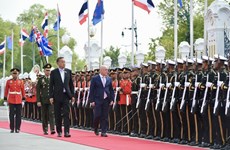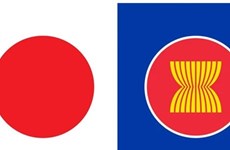Indonesia expands entry restrictions for foreign workers over COVID-19
Indonesian Law and Human Rights Minister Yasonna Laoly has said foreign workers involved in the national strategic projects starting July 21 are not allowed to enter the country, as the government has expanded restrictions to curb the surge in COVID-19 cases.
 A road in Jakarta during the time of social distancing to curb COVID-19 (Photo: Xinhua/VNA)
A road in Jakarta during the time of social distancing to curb COVID-19 (Photo: Xinhua/VNA)Foreign workers who previously came as part of a national strategic project, or for reasons of family union, can no longer enter Indonesia, Laoly noted.
Foreigners allowed to enter Indonesian territory are holders of diplomatic visas or residence permits, medical and humanitarian workers, or transportation workers who carry goods. They are permitted to enter Indonesia with the recommendation of the relevant ministry or institution, he added.
Indonesia is facing a surge in COVID-19 cases, with the entry of the more contagious Delta variant.
As of July 21, the country had recorded 2,983,830 cases, including 2,356,553 recoveries and 77,583 deaths./.













